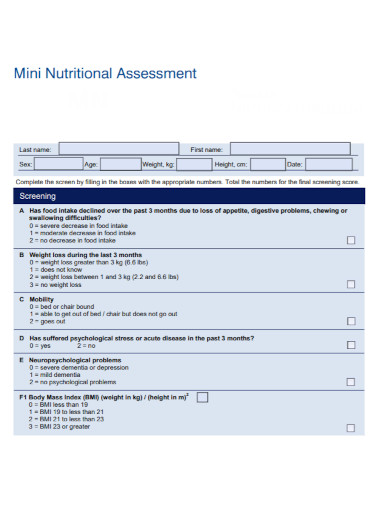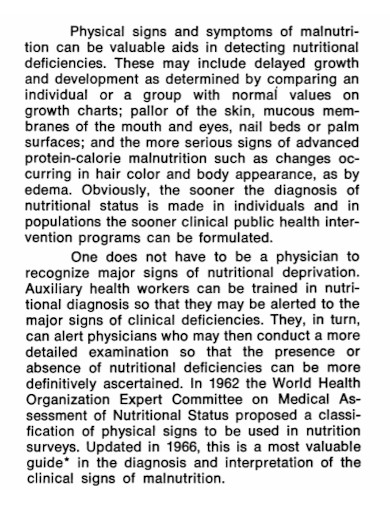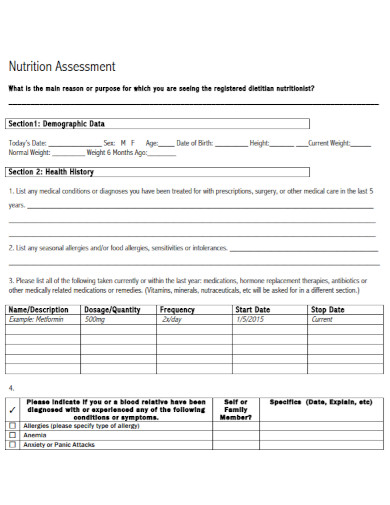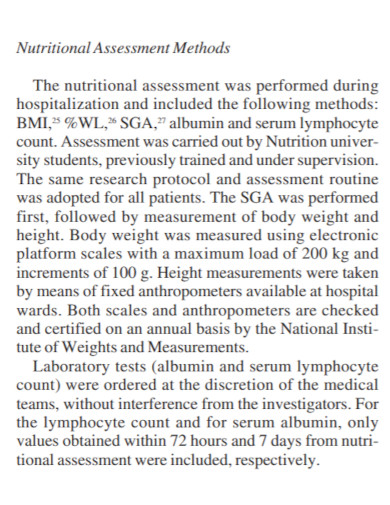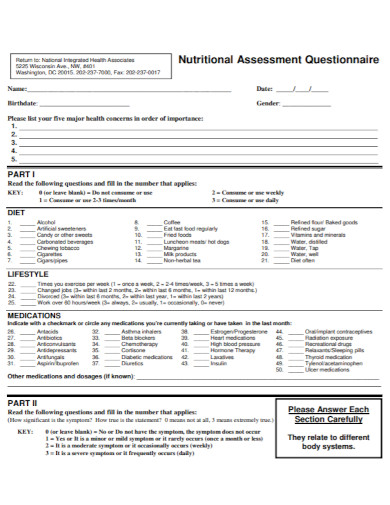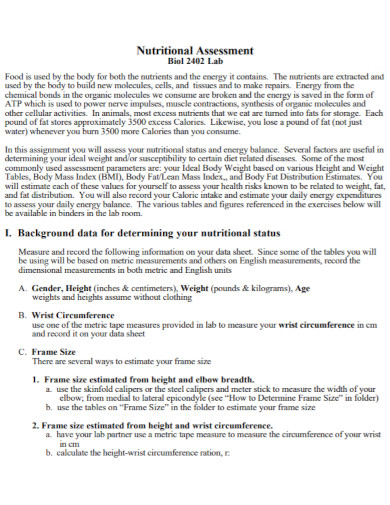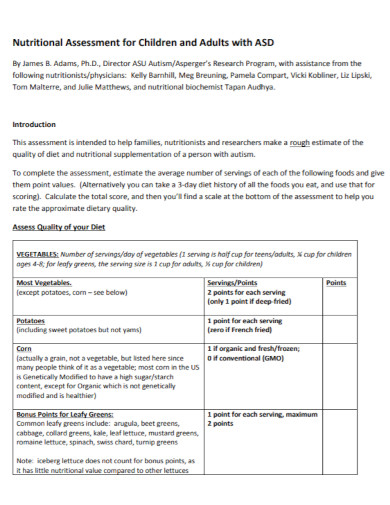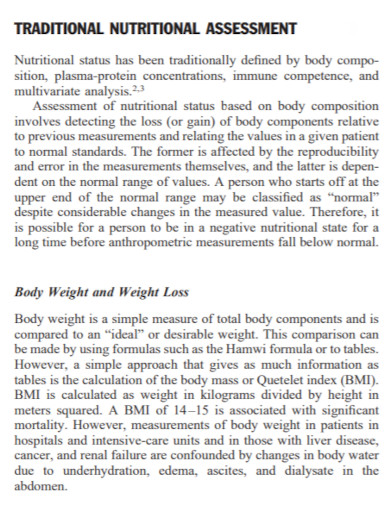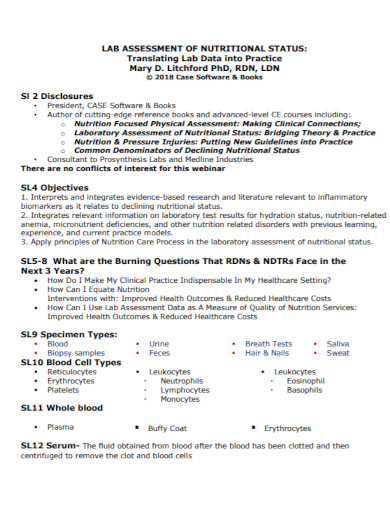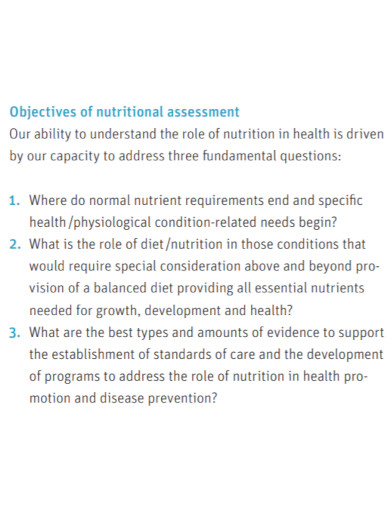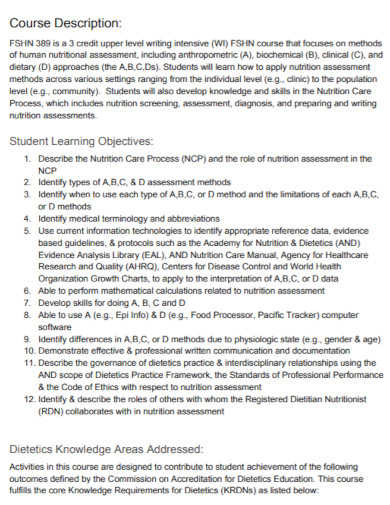9+ Nursing Admission Assessment Examples to Download
Nutritional, nutrient deficiency, nutrition, food, vegetables and fruits, lastly picky eaters. What comes to your mind when you hear these random words? If you have ever experienced or heard of these words, you would have had an assessment to go with this. Especially those who may be picky eaters. Children are more likely to fall under this category of picky eaters as well as the fact that they often are too difficult to convince. To know more about a nutritional assessment, check out the article below.
10+ Nutritional Assessment Examples
1. Mini Nutritional Assessment
2. Clinical Assessment of Nutritional
3. Nutritional Assessment Form
4. Standard Nutritional Assessment
5. Nutritional Assessment Questionnaire
6. Nutritional Assessment in PDF
7. Nutritional Assessment for Children
8. Traditional Nutritional Assessment
9. Lab Assessment of Nutritional
10. Basic Nutritional Assessment
11. Human Nutritional Assessment
Definition of Nutritional
To begin the article, we must define the term nutritional. This means relating to or referring to nutrition. The process of nourishing the body with nutrients and vitamins. The act of obtaining foods that are necessary for growth and development. The source of nourishment. The process of eating foods that are healthy and would help us grow stronger. The content of food in a substance which helps an individual stay healthy.
Definition of Assessment
An assessment is an examination. This examination allows you to gather data, analyze, and make your own judgement. The process of assessing a person for their behavior, skills, and talent before making a decision. This is a systematic approach to understanding a subject before giving your own verdict. In this case, the assessment is going to be used as a tool to gather information about the nutritional value of human consumption. To be able to do this, an individual needs to gather data through a series of questions asked towards the subject. All for educational and medical purposes.
Definition of Nutritional Assessment
According to the British Dietetic Association BDA, a study they made in 2012 stated that a nutritional assessment is a process of This is so they could make an evaluation. Their study was about the related issues of nutrition and how it affected people. This study was also about the cause and the effect it had on people who had nutritional deficiency.
Purpose of Nutritional Assessment
The sole purpose of doing a nutritional assessment is to identify. To gain knowledge about the risks of nutritional deficiencies. How this affects children and adults. In addition to that, it also defines not only a child’s nutritional status, but adults as well. To clearly see the relevant problem and to be able to monitor the changes if there is any in their nutritional status.
Tools Used for Nutritional Assessment
Here are some examples of the tools you may see nutritionists use for assessing. There are a lot of tools you may use for making an assessment. As mentioned, these are just a few example tools that range from common and often used to common but rarely used. Depending on the assessor who chooses to use which tool for assessment. However, each person differs with what tool. These are just some examples for you to get a good idea of how it looks and what it is for.
- Checklist
- Diagram
- Fill Out Forms
- Narrative
- Outline
- Questionnaire
Tips for Writing a Nutritional Assessment
Here are some tips for you to get started. If you have done an assessment in the past, consider this a review or just extra information. For those who are new to the assessment, think of this as a road map to writing a nutritional assessment. May these tips help you out in any way it can.
- Gather enough information before you start the assessment
- Understand your audience and study
- Avoid difficult jargon
- Place evidence along with your assessment
- Evaluate and record your assessment results
FAQs
How useful is a nutritional assessment?
If you are assessing a child or an adult on their daily intakes or underlying illnesses due to malnutrition, this assessment is made for that.
What to avoid while doing the assessment?
Avoid writing information that may not be true to the person you are assessing. Avoid using complicated jargons as you will be giving the result to the individual you are assessing. You may be able to understand the jargon, but they do not. It is best to use simple or general terms.
Who is my audience?
Your audience can range from children to older people. From those who are healthy or those with problems like diabetes.
Is the results of the assessment enough to make a diagnosis?
If you are a certified nutritionist, you may be able to use the assessment to make a diagnosis. But it is best to tell the individual to go see a doctor for problems that may still be related to nutrition. Avoid having to make a diagnosis outside of your field.
Having to assess people on their nutrition can sometimes be a problem. Especially when some do not want to know and some do not think that the assessment is useful. But as you do what you believe is right for them, continue doing so.


![10+ Nutritional Assessment Examples [ Food, Human, Clinical ]](https://images.examples.com/wp-content/uploads/2021/07/10-Nutritional-Assessment-Examples-Food-Human-Clinical-.jpg)
